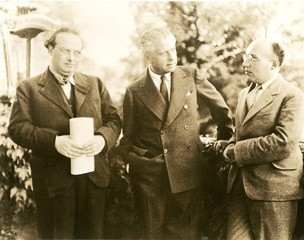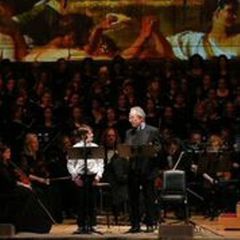|
Back
Kurt Weill As He Shouldn’t Be Heard New York
Isaac Stern Auditorium, Carnegie Hall
05/06/2015 - & May 7, 2015*
Kurt Weill: The Road of Promise (U.S. Premiere of the concert adaptation of The Eternal Road)
Anthony Dean Griffey (The Rabbi), Mark Delavan (Abraham/Moses), Ron Rifkin (The Adversary), Eli Tokash (The Thirteen-Year-Old Boy), AJ Glueckert, Ron Rifkin, Eli Tokash (Actors), Anthony Dean Griffey, AJ Glueckert (Jacob, Boaz, David, Isaiah), Megan Marino (Miriam, Ruth), Justin Hopkins (The Dark Angel), Philip Cutlip (Joseph, Solomon, Jeremiah), Anonymous (Voice of God), Sean Fallen (Angel #1), Jose Pietri-Coimbre (Angel #2)
Concert adaptation by Ed Harsh, Collegiate Chorale, Orchestra of St. Luke’s, Ted Sperling (Conductor and Director)
Wendall Harrington (Video projections), Frances Aronson (Lighting design)

F. Werfel, M. Reinhardt, K. Weill (© The Weill-Lenya Research Center, Kurt Weill Foundation for Music, Inc/Collegiate Chorale)
”The things that you’re liable/To read in the Bible/It ain’t necessarily so.”
Ira Gershwin, from Porgy and Bess (1935)
Two years after Sportin’ Life danced and sung his eight-minute “Skeptic’s Guide to the Old Testament”, an eccentric quartet of American and German Jews assembled at a palace in Salzburg, to plan the production of a six-hour Brobdingnagian cantata/opera/show biz/Passion Play on the same theme. The basis wasn’t quite the historical mythology of the Jewish people, and wasn’t quite a 1937 ballyhoo to populate Palestine, and wasn’t exactly a putdown of literally taking the Bible at face value.
In fact, between its first abortive production to this week’s cumbersome (if truncated two-hour) production of the awkwardly titled The Road of Promise (from the original English Eternal Road and the German Der Weg der Verheissung), nobody has been able to figure out what it was supposed to be.
And therein lies a problem far less solvable than whether the Old Testament is “necessarily so”.
This concert version was sad, but that was hardly the fault of the excellent soloists, the fine conducting of Ted Sperling or even the (frequently screaming) Collegiate Chorale. Rather, one must look at the quartet of figures for the 1937 genesis of the work.
The least known was an American philanthropist, obsessed with populating Palestine with Jews, fulfilling a promise made two decades before. The most famous was the legendary German epic show/film producer, Max Reinhardt, reputed for productions involving casts of thousands with equal numbers of singers, orchestras etc. (Yet in my opinion, his true genius was casting Mickey Rooney as Puck in the film of Midsummer Night’s Dream.)
Czech-born Jewish librettist Franz Werfel was an undeniable expressionistic poetic genius, educated in a Catholic school (though bar mitzvah), a scholar of Islamic and Christian mysticism, good friend of Franz Kafka, a student of the Turkish Armenian genocide in a best-selling novel, Werfel was husband of a woman who was blatantly anti-Semitic yet whose husbands (including Gustav Mahler) were all Jewish.
Finally the composer, Kurt Weill, whose only problem was that he was too good at everything musical. A student of Humperdinck and Busoni, he started with neo-classic/atonal concertos and symphonies, then filled Berlin with the most scathing vibrant cabaret music, as well as Threepenny Opera thanks to his Communist poet-collaborator Bertolt Brecht. And finally coming to America, the incandescent fire cooling to calmer radiance, yet composing immortal show-tunes thanks to the literary inspiration of S.J. Perelman, Ogden Nash, Maxwell Anderson and Elmer Rice. Dying all too soon at the age of 50.
So in early 1937 Salzburg (prior to the Anschluss) those four used their money and genius together, creating the work which finally had its premieres this week. And, in my opinion, crashed.
The fault lay not in these stars, but in those two main selves–Werfel and Weill–who were too complex for their own good.
In wondering what Kurt Weil and Franz Werfel–such pointed, vibrant, fascinating artists in all their incarnations–were doing here, one might consider quoting Mr. William F. Clinton. When asked last week why he takes half-a-million bucks for this speeches, he replied, “We have bills to pay.” (With the same gnomic mendacity as “I sniffed, I didn’t inhale.”)
Had Kurt Weill the same problem, he wouldn’t have created such hodgepodge of styles. What did he need with a Handelian fugue? A Mendelssonian entracte? An audience-pleasing quintet that could have come from Verdi? How did he end the first act with a montage starting with a Nazi oom-pah march, an uninteresting arioso, a Gilbert-and-Sullivan roundelay and ending with a chorus schmaltzier than a Bernstein finale?
At another time, these could have been parodies, but Weill was apparently all too serious in such a gallimaufry. And while great music depends on surprise, these numbers seemed rootless, amorphous. Like It ain’t necessarily so, Weill adapted his music from synagogue music, but these numbers were more like adoptions from different parents.
Then again, perhaps he was stymied by Franz Werfel, who could never write simply when he could write with complexity. Whatever had been decided originally, Werfel began with three main characters: a 13-year-old boy (i.e. past bar mitzvah, actually a man), and a Rabbi (who tried to explain the stories of the Old Testament), an “Adversary” who showed that these stories :”weren’t necessarily so”.
As well as a piped-in Voice of God. “God “is listed in the program as played by “Anonymous”, and this was the only humor I could find in the evening. (Though, it could be the most profound Spinoza-type metaphysics. Go figure.)

E. Tokash, R. Rifkin, Collegiate Chorale, Orchestra of St. Luke’s (© Erin Baiano)
To their credit these three were wonderful. Anthony Dean Griffey had one of the more stentorian voices of the evening, Ron Rifkin, in a speaking role, had all the sharpness, verisimilitude and honesty to impress the young Eli Tokash, whose soprano voice was displayed well. (Though, since all the solos were miked, one never knows what is really good.)
Others in the cast were probably excellent, but I did get confused with Moses, Jacob, Miriam, Isaiah, and the Soul of Moses. As well as the full Collegiate Chorale blasting out prayers, imprecations, commentaries and supplications. And besides the Biblical fables, we also had the subplot of the “enemies” closing in (the Nazis, never mentioned) and the vision of a new Holy Land.
True, the two hours could have been four hours longer, since Franz Werfel had, in the original, added hours and hours of commentary in the synagogue. Not only was this thoroughly circumcised, but the Mohel actually castrated most of the commentary.
On the surface, The Road of Promise looked colorful enough, with constantly changing paintings on the back wall of Isaac Stern Auditorium. Like the music, though, this became a hodgepodge. Most of it had the literalism of a Seventh Day Adventist coloring book. One doubts that Werfel or Weill would have appreciated them. But the visual also included cartoons of Moses and the Golden calf, ersatz Greek and early Renaissance statues and near-realistic picture of the wilderness.
Perhaps this was right. Perhaps, taking this unwieldy (or, in Yiddish, klutzy) composition didn’t need anything inspirational or creative. One is always happy to hear a new work by Kurt Weill, one is never disappointed by the Orchestra of St. Luke’s. But when returning home, I put on a recording of Lotte Lenya singing some Kurt Weill cabaret songs. The satisfaction of hearing this so-poignant composer in all his salacious purity cleansed this mind of the evening’s discomfiting, even aberrational assemblage.
Harry Rolnick
|